Red Birds are one set of beautiful birds in Texas that you can see at different times of the year. Some stay in the states, throughout while some prefer staying only in winter.
In this article, we are looking at some of the most common red birds in Texas which include their structure, feeding habits, and habitation.
1. Northern Cardinal
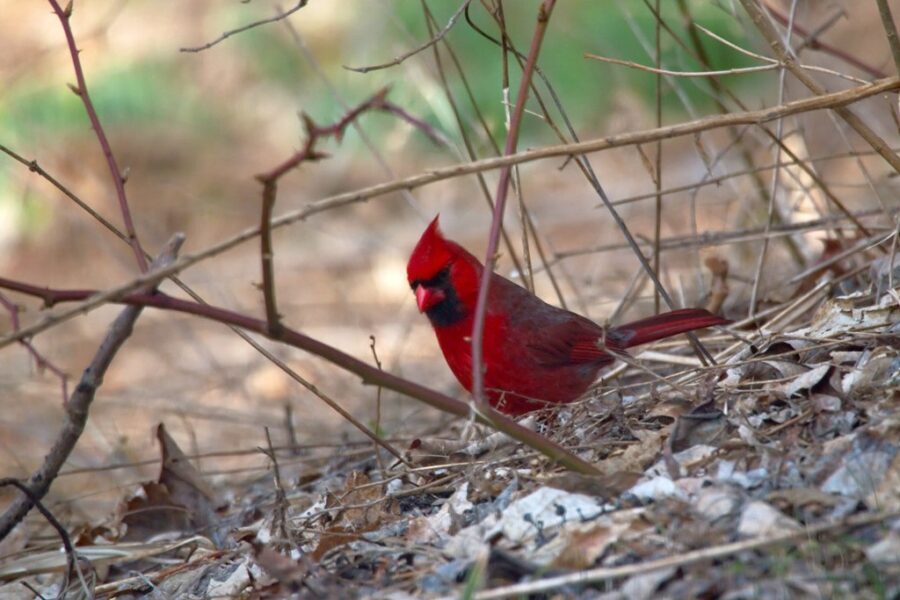 Nothern_Cardinal_(Redbird)_birdsflock.com Red Birds In Texas
Nothern_Cardinal_(Redbird)_birdsflock.com Red Birds In Texas
Botanical Name: Cardinalis cardinalis
Northern Cardinals are the most popular red birds in Texas which are seen all year round. They are mostly found in the eastern and southern states and they strongly defend their territory.
They are beautiful birds with the male having a redhead, body, and tail, with black faces. While the females are a little showy with a sharp brown crest, brown coloring, red highlights, and red beaks.
How to attract them: Northern Cardinals are attracted majorly to backyard feeders with sunflower seeds, millet, peanut hearts, milo, platform feeders, tube feeders, hoppers, and scattered food on the ground.
2. Vermillion Flycatcher
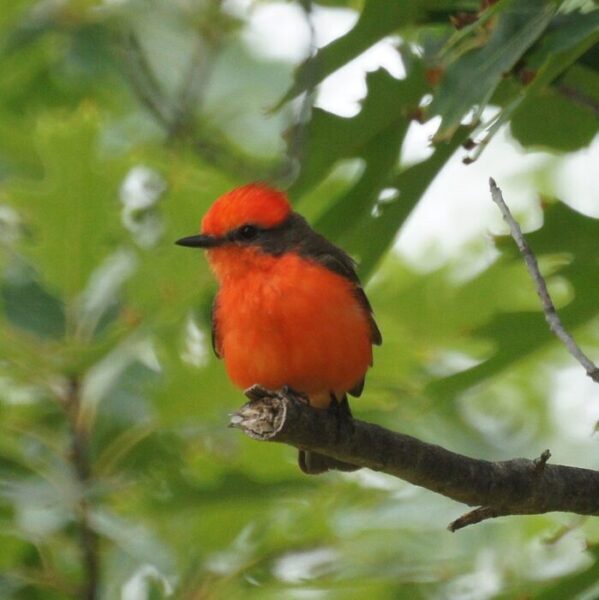 Vermillion Flycatcher
Vermillion Flycatcher
Botanical Name: Pyrocephalus
Vermilion Flycatchers are also, among the famous red birds of Texas that can be seen year-round. They are mainly seen in the southern part of Texas. They are also seen in smaller quantities along the Gulf Coast.
From the front, Vermilion Flycatchers are bright red birds’ brownish birds from the back. They have a brown mask across their face. The females are mainly gray and brown with a pale reddish belly.
How to attract them: They are attracted to insects flying or sitting on exposed perches.
3. House Finch
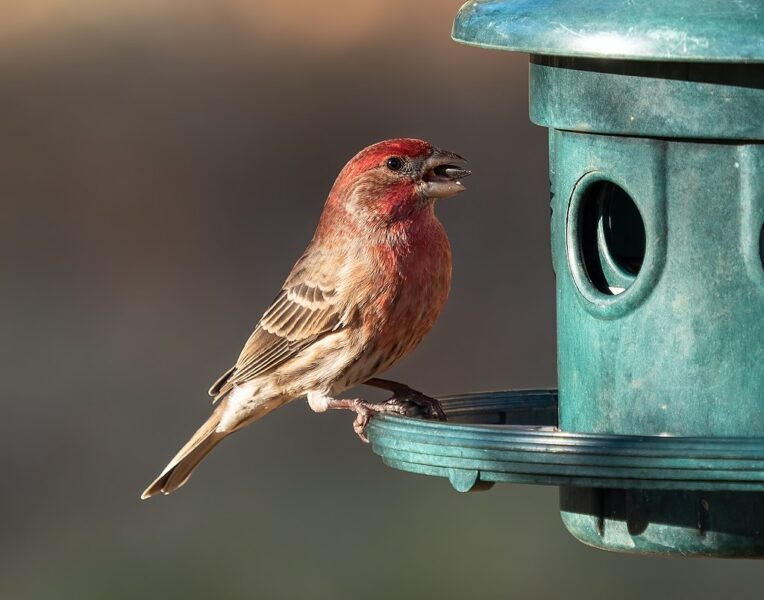 Birdsflock.com House Finch
Birdsflock.com House Finch
Botanical Name: Haemorhous mexicanus
House Finch is among the famous red birds in Texas that are seen all year round, they are easy to identify as the males have red heads and breasts, while the female has brown streaked coloring all over their body.
You can easily find them in farms, parks, forest edges, and backyard feeders. They always like hanging around noisy areas.
How to attract them: Backyard feeders with black oil sunflower seeds are their major attraction. They also feed on tube feeders or platform feeders.
4. Purple Finch
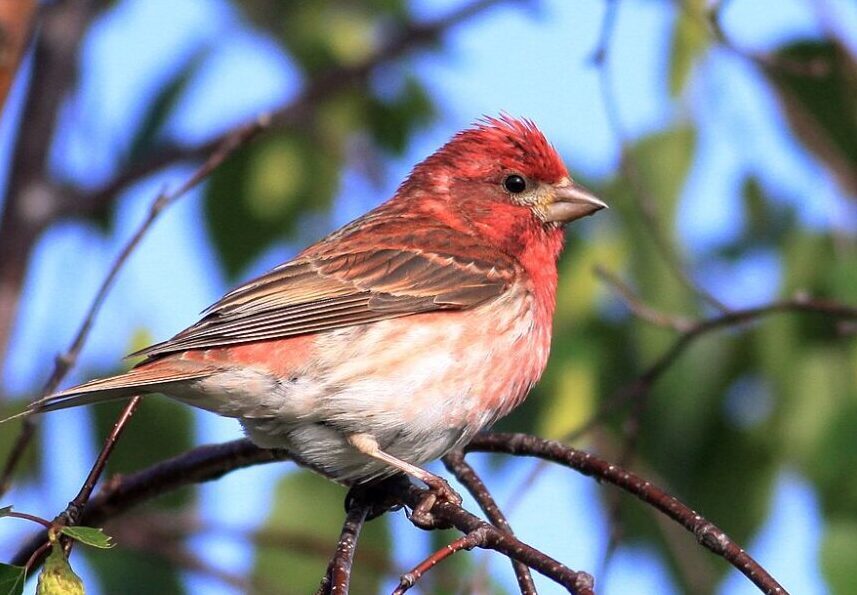 Birdsflock.com Red Birds In Texas Purple_Finch
Birdsflock.com Red Birds In Texas Purple_Finch
Botanical Name: Haemorhous purpureus
Purple Finch is majorly seen during the winter times in Texas and leaves when summer is approaching. They don’t breed in Texas, they do their breeding in Canada, and they are always found in the northeast part of the pacific coast.
Purple Finch has a reddish-purple head and breast with flanks of brown on the back and wings.
How attracts them: They are attracted to feeders for black oil sunflower seeds, and seeds. Also, they are always spotted feeding on buds, nectar, and berries.
5. Scarlet Tanager
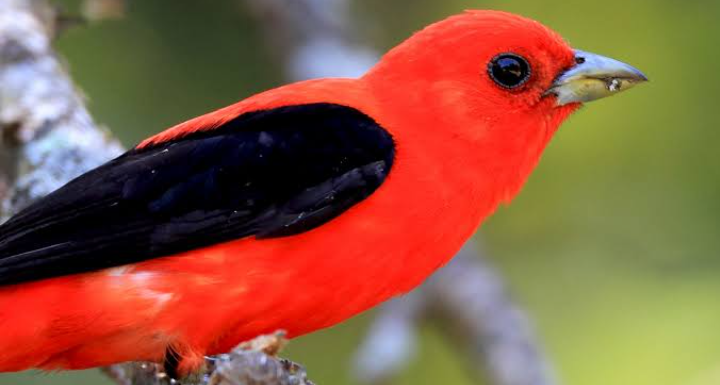 scarlet-tanager birdsflock.com red birds in texas
scarlet-tanager birdsflock.com red birds in texas
Botanical Name: Piranga olivacea
Scarlet Tanagers are bright red birds with black tails and wings seen majorly in the eastern part of the state, especially during the winter. They are migratory birds that spend their winter in Texas and migrate to South America in January or February.
They are very hard to spot, as they live on a high forest canopy.
How to attract them: Scarlet Tanagers are attracted to berry plants such as raspberries, huckleberries, blackberries, serviceberries, mulberries, juneberries, strawberries, and chokeberries.
6. Cassin’s Finch
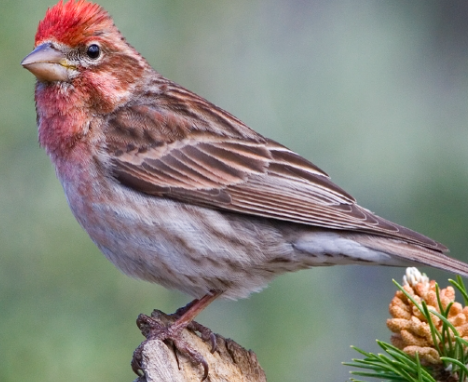 Cassin Finch birdsflock.com red birds in texas
Cassin Finch birdsflock.com red birds in texas
Botanical Name: Haemorhous cassinii
Cassin’s Finch is only seen in winter, majorly in the western part of Texas. They are beautiful birds with a rosy pink head, red crown, red breast, white belly, and brownish wings and back.
They are mostly seen in mountainous forests in the western part looking for seeds to feed on.
How to attract them: They have attracted sunflower seed feeders during the winter, and fruiting shrubs such as mulberries, cotoneaster, firethorn, grape, and apple.
7. Common Redpoll
 common redpoll
common redpoll
Botanical Name: Acanthis
Common Redpolls are very hard to spot in Texas, but few have been seen recently in the northern part of the state. They are brown birds with white all over, a red forehead, and pinky breasts.
Common Redpolls have red foreheads, pinky breasts, and are brown and white over the rest of their bodies.
One amazing thing about this bird is that it can eat up to 42% of its body mass daily and save up to 2 grams of seeds in a stretchy part of its esophagus.
You can easily find them in weedy fields where they are mostly spotted feeding on catkins in trees.
How to attract them: Common Redpolls are attracted to feeders for small seeds such as thistle and nyjer seeds
8. Hepatic Tanager
 Hepatic Tanager
Hepatic Tanager
Botanical Name: Piranga flava
Hepatic Tanagers are red birds that are seen in Texas during the summertime in the southern and western parts of the state. They can be specifically spotted in Big Bend National Park and the Davis Mountains.
Hepatic Tanager males are vividly red birds with flashes of gray on the back. While the Females are yellow.
Hepatic Tanagers are migratory birds that breed in Canada and southwestern states before going to spend the winter in Texas, Mexico, Central, and South America.
You can find Hepatic Tanager on mountains with pine or oak woodlands. They feed on insects and spiders on the top of trees.
How to attract them: Berries such as cherry and grapes are their major attraction.
9. Flame-colored Tanager
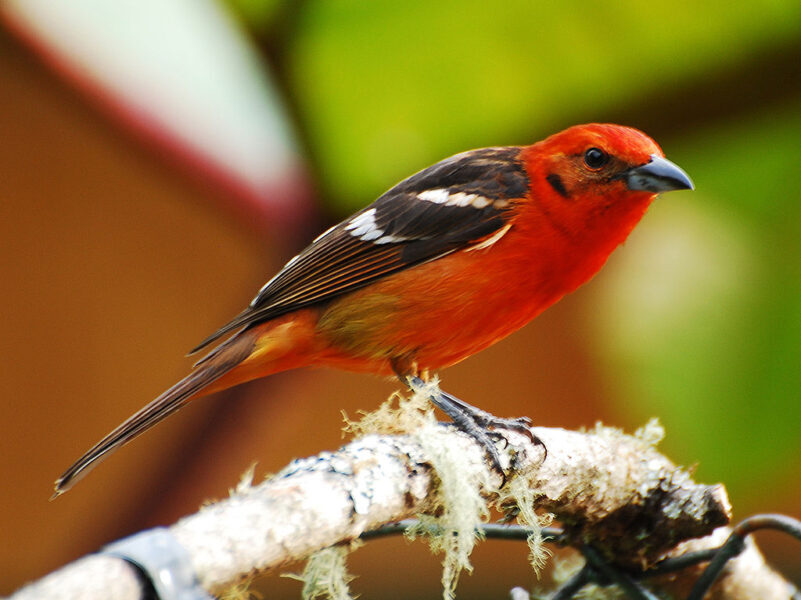 Flame-colored_Tanager_birdsflock.com-Red-Birds-In-Texas
Flame-colored_Tanager_birdsflock.com-Red-Birds-In-Texas
Botanical Name: Piranga bidentata
Flame-colored Tanagers are very difficult to spot in Texas but they can sometimes be seen in the southern part of the state. You can also see them in Big Bend National Park or along the Gulf coast near the southern border. They are migratory birds that can only be seen in Texas during March and August. They do their breeding in Arizona and inhabit woodland Mexico and Central America.
The male species of the Flame-colored Tanagers mainly orange-red coloring, with darker tails and wings. The Females are more yellow-orange.
How to attract them: Insects and berries are known to be their major food to which they are attracted.
10. Summer Tanager
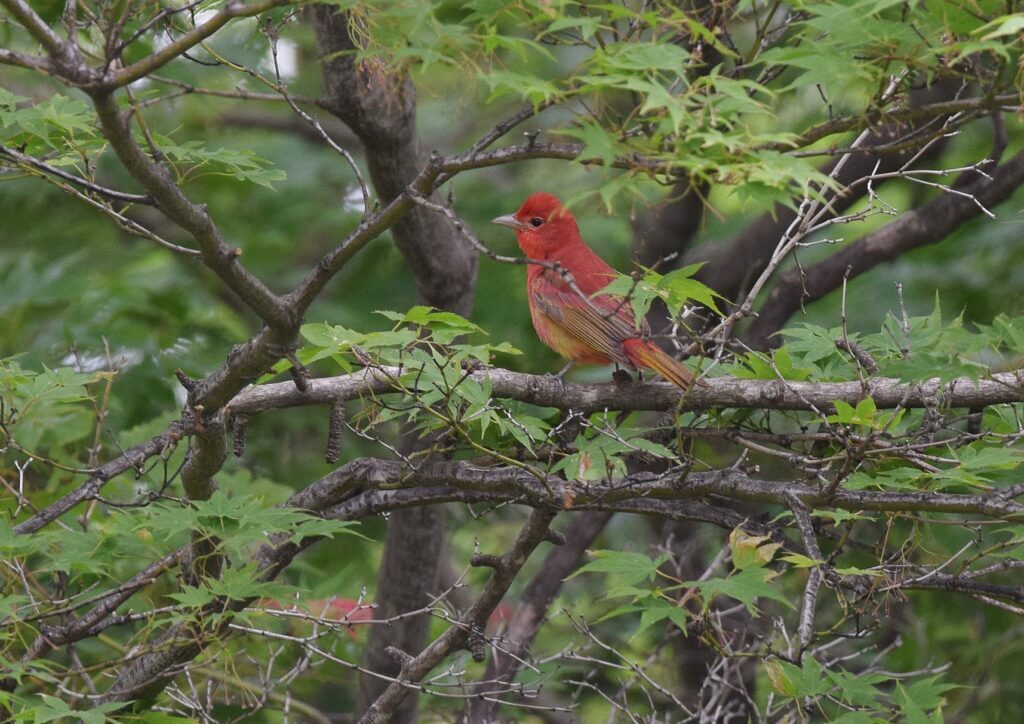 Summer_Tanager Birdsflock.com Red Birds In Texas
Summer_Tanager Birdsflock.com Red Birds In Texas
Botanical Name: Piranga rubra
Summer Tanagers are common red birds in Texas that can be spotted all year but are more common during the spring migration and through the summer.
Summer Tanager males are bright red birds and females are yellow.
Also, they are forest songbirds that can be found in open woodlands. They mostly feed on bees and wasps in mid-flight.
How to attract: Summer Tanagers are greatly attracted to berry bushes and fruit trees.
11. White-winged Crossbill
 White-winged Crossbill
White-winged Crossbill
Botanical Name: Loxia leucoptera
White-winged Crossbills is one of the endangered red bird species in Texas. For the past decade, it has been spotted just a few times near San Antonio and Houston as accidental visitors. They live mainly in Canada, Alaska, and the northern US states. So if you want to see any, you must go up north.
White-winged Crossbills are birds with heavily crossed beaks. The males are vividly red birds with black wings and tails and two white wing bars. The females are yellow and brown with two white wing bars.
They don’t have a specific seasonal movement schedule. As long as there is food, they can stay in a place throughout the year.
How to attract them: You can attract a White-winged Crossbill to your backyard by having plenty of seeds, especially if you live up the north US.
12. Red Crossbill
 Red Crossbill
Red Crossbill
Botanical Name: Loxia curvirostra
Red Crossbills can be spotted all year in Texas mostly in the west. However, they are seen in small quantities as they are rare to see.
Red Crossbill males are vivid red birds with darker wings and tails, while the females are yellow and brown.
You can locate a Red Crossbill in coniferous forests, and along roadsides consuming grit in the mornings. They feed on conifer seeds and forage. They go to the extent of breaking cones into the tress by their powerful breaks.
How to attract them: You can use nuts and seeds to attract a Red Crossbill.
13. Pyrrhuloxia
 Pyrrhuloxia
Pyrrhuloxia
Botanical Name: Cardinalis sinuatus
Pyrrhuloxia is a famous bird mainly seen in the western part of the state. The male, are vivid grey with a lot of red coloring on their face, tail, and breast, while the female is dull gray with less red coloring.
They mostly live in hot deserts in Texas, Arizona, New Mexico, and Mexico.
How to attract them: Pyrrhuloxia feed majorly on seeds and insects. They are also attracted to feeders with sunflower seeds. However, they prefer it when it is scattered on the ground.
14. Painted Bunting
 Painted Bunting
Painted Bunting
Botanical Name: Passerina ciris
Painted Bunting is a popular bird in Texas. Some of them stay in Texas throughout the year, while some only come to Texas to breed between April and October, then migrate back to Southern Florida, Central America, and Caribbean islands.
Painted Bunting males are brightly colored with red coloring underneath and bright blue heads, green wings, and backs. Females are bright yellow-green.
You can locate Painted Bunting in semi-open habitats where they feed on insects and seeds.
How to attract them: You can attract painted Bunting to your yard by having low dense vegetation and feeders filled with black oil sunflower seeds and millet seeds.
What bird is totally red?
The strawberry-colored male Summer Tanager is the only completely red bird in North America. It is usually a sight to behold when they fly.
Conclusion
Redbirds are indeed a wonderful design of nature. I hope you found this article interesting. For more informative post on birds, do slide into the next post.
